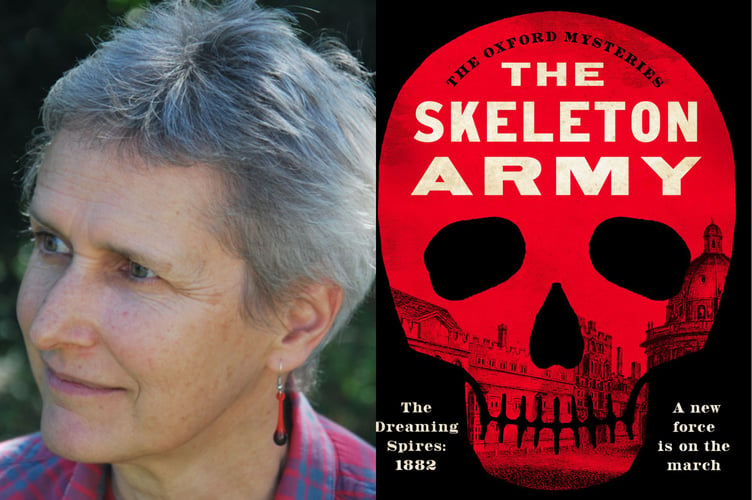WHAT does Oxford’s world famous Bodleian Library have in common with a Coleford cafe?
While most would say very little, the unlikely parallel comes with both having played a key role in the creative development of local author Alis Hawkins’ new historical mystery, The Skeleton Army.
Alis, who lives in Coleford with her partner Edwina, is gearing up for the release of her latest novel - the second in her Oxford Mysteries series - in April this year.
Following on from the widely-acclaimed first in the series, A Bitter Remedy, The Skeleton Army follows the series’ main characters - uncompromising Welshwoman Rhiannon ‘Non’ Vaughan and Jesus College don Basil Rice - as they investigate the truth behind another suspicious death in one of the poorest quarters of Victorian Oxford.
While A Bitter Remedy saw her characters caught up in the “murky underworld” of the Victorian patent remedy industry, A Skeleton Army sees them investigating the newly-established Salvation Army, which - quite surprisingly by modern standards - Alis says was a “highly controversial” organisation at the time.
“We think of the Salvation Army as ultra-respectable these days, almost cosy, but it was positively scandalous when it first migrated out of the East End of London, not least because some of its most successful leaders were working class women”, she explained.
“In the book, the Salvation Army is in violent conflict with the popular movement that’s grown up in opposition to it in Oxford and elsewhere – the Skeleton Army.
“The Skeletons are determined to push the Salvation Army out of Oxford, and they’re not fussy about the methods they use to do it. Which may include murder…”
Alis has written popular historical fiction for a number of years and has twice been shortlisted for the Crime Writers’ Association’s prestigious ‘Historical Dagger’ award.
Her research for The Oxford Mysteries series has varied from immersing herself in online archives of Oxford newspapers from the 1880s, to being granted access to Oxford University’s Sommerville College, where she was given permission to read a collection of letters written by some of the first young women to have studied there.
She explained: “Newspapers are a brilliant way of finding out what ordinary people’s day to day life was like.
“As well as reports of events in the city on a week-by-week basis, and details of who was being hauled up before the magistrates, the adverts tell you a lot about how people lived their lives, and the letters page gives a unique insight into the differing attitudes of the day.
“Just like now, opinions varied on every possible subject.
“But online research can only take you so far and there’s nothing like actually seeing the streets and buildings where your characters live.
“Though Oxford is very different now from the city it was in the 1880s – whole sections of the centre have been demolished and rebuilt – some things don’t change and if you want your book to feel authentic, you just have go and see the view from a particular vantage point, or how the early morning light strikes a particular landmark.”
She added: “While I’m in Oxford, i’ll often take the opportunity to use the University Library – the Bodleian – to find books which are hard to get hold of elsewhere. Some of the books written about the early women’s college movement are pretty rare as they were printed in small numbers, so the fact that there’s at least one copy of each in the Bodleian is a fantastic resource.”
Alis moved to Coleford 11 years ago, having actually been born in Lydney but moving across the border to Monmouthshire when she was just six months old.
While her research has taken her to some of Oxford’s most iconic locations, Alis writes her novels at home in the Forest.
Although a lover of the forest itself, she says that the tranquility of home amongst the trees isn’t always the best thing when actually putting pen to paper.
“When I’m actually writing, too much quiet can sometimes be a hindrance, so on those occasions, I’ll take my laptop and sit in one of the coffee shops in town to work. But I walk every day and I rely on those quiet times, out in all weathers, to think about my characters and the situations they find themselves in. We’re so lucky to have the Forest on our doorstep.”
The Skeleton Army will be published on April 4 and is available to pre-order at any bookshop, or online at Bookshop.org and Amazon.




